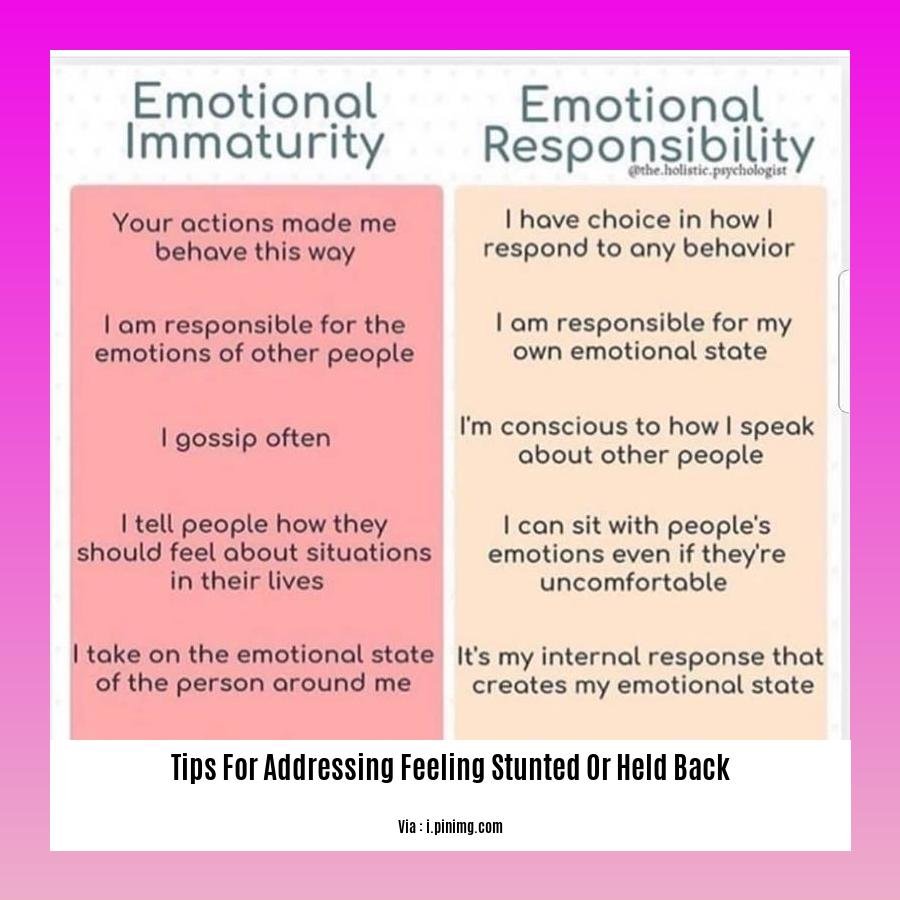**Tips for Addressing Feeling Stunted or Held Back** In the realm of personal evolution, the sensation of being stunted or held back is a universal hurdle. Whether it’s a career plateau or a mental block, the feeling of stagnation can stifle growth and leave us yearning for more. In this article, we’ll delve into practical strategies to help you overcome these obstacles and unlock your full potential.
Key Takeaways:

- Embrace uncomfortable emotions instead of avoiding them.
- Utilize coping mechanisms such as talking, journaling, or meditation to process difficult feelings.
- Suppressing emotions can result in mental distress.
- Mental strength involves regulating emotions and responding to challenges effectively.
Tips for Addressing Feeling Stunted or Held Back
Feeling stuck or held back can be a frustrating and disheartening experience. But it’s important to remember that you’re not alone and that there are steps you can take to overcome these feelings.
Acknowledge and accept your feelings. The first step to addressing these feelings is to acknowledge and accept them. Trying to suppress or ignore them will only make them worse in the long run. Allow yourself to feel these emotions fully without judgment.
Identify the source of your feelings. Once you’ve acknowledged your feelings, it’s helpful to try to identify the source of them. Are you feeling stunted or held back because of a lack of skills or knowledge? Is it due to a negative mindset or limiting beliefs? Understanding the root cause of your feelings can help you develop targeted strategies for addressing them.
Challenge negative thoughts and beliefs. If you find yourself engaging in negative self-talk or holding limiting beliefs, challenge these thoughts. Are they based on evidence? Are they helpful or harmful? By questioning and reframing negative thoughts, you can break free from their grip and cultivate a more positive mindset.
Set realistic goals and take small steps. Feeling overwhelmed by big goals can lead to feelings of inadequacy. Instead, break your goals down into smaller, more manageable steps. This will help you stay motivated and make progress without feeling overwhelmed.
Seek support from others. Sometimes, talking to a friend, family member, therapist, or coach can help you gain a different perspective on your situation and develop coping mechanisms. They can provide encouragement, support, and accountability as you work through these feelings.
Take care of your physical and mental health. Your physical and mental health can impact your feelings of well-being and self-efficacy. Make sure you’re getting enough sleep, eating a healthy diet, and exercising regularly. Engage in activities that bring you joy and relaxation, such as hobbies, spending time in nature, or practicing meditation.
Practice self-care and compassion. It’s important to be kind and compassionate towards yourself, especially when you’re feeling stuck or held back. Treat yourself with the same love and support you would offer a friend. Practice self-care activities that nourish your mind and body, such as mindfulness, journaling, or spending time in nature. Remember that you’re not perfect and that it’s okay to make mistakes.
Need to better communicate your desires for personal growth within your relationships? communicating desires for personal growth within relationships offers plenty of useful advice to help you get started. Looking for ways to express your need for space or individual development? ways to express the need for space or individual development provides many methods for doing so. Want to raise discussions about evolving personal interests? how to raise discussions about evolving personal interests is for you.
Develop a Growth Mindset
Embrace the power of a growth mindset
A growth mindset places utmost importance on the power of continuous learning and development. It allows for the belief that abilities can be cultivated through persistent effort and constructive feedback.
In contrast, a fixed mindset assumes that abilities are fixed traits, hindering progress and limiting potential.
Adopt growth mindset principles
- Embrace challenges: Welcome challenges as opportunities for growth and skill acquisition.
- Learn from setbacks: Instead of being discouraged by mistakes, see them as stepping stones towards improvement.
- Seek feedback: Actively seek constructive criticism and insights to identify areas for improvement.
- Celebrate progress: Acknowledge and appreciate every step forward, regardless of how small.
Key Takeaways:
- Use growth language: Focus on progress and learning in your conversations and self-talk.
- Embrace challenges: View setbacks as opportunities for growth and learning.
- Seek growth opportunities: Actively engage in experiences that promote skill development.
- Celebrate growth: Acknowledge and celebrate achievements to reinforce a growth mindset.
Embracing a growth mindset is a transformative tool that empowers individuals to unlock their full potential. By shifting our beliefs and behaviors towards continuous improvement, we set ourselves on a path of ongoing growth and fulfillment.
Citation:
Dweck, C. (2006). Mindset: The new psychology of success. New York: Random House.
Take Calculated Risks and Step Outside of Your Comfort Zone
Key Takeaways:
- Stepping outside your comfort zone is imperative for growth and development.
- Calculate risks to push boundaries without jeopardizing safety.
- Overcoming fears builds self-confidence and resilience.
- Stepping outside your comfort zone opens up new opportunities.
- Start small and gradually increase challenges.
Pushing past your comfort zone can be daunting, but it’s essential for unlocking your potential. Embrace calculated risks; they’re not about jumping recklessly into the unknown. Instead, they’re measured and well-thought-out steps that allow you to explore the unknown while mitigating potential risks.
Just as a muscle grows stronger with resistance training, so too can your personal growth accelerate when you challenge yourself. Start modestly by venturing just slightly beyond your comfort zone. As you succeed, push the boundaries a bit further, gradually expanding your limits.
Remember, growth often comes from facing fears. By stepping outside of your comfort zone, you’re not just overcoming obstacles; you’re building resilience, self-confidence, and the ability to tackle even greater challenges in the future.
Embrace the opportunities that lie outside your comfort zone. It’s where you’ll discover new passions, develop unexpected skills, and create memories that will last a lifetime.
Citation:
- Thriveworks Counseling. (2023). Step Outside of Your Comfort Zone: Benefits and Tips. Retrieved from:
Seek Support and Guidance from Others
Building strong relationships and seeking professional help when needed are essential for personal growth and overcoming obstacles. Here’s how you can seek support and guidance from others:
-
Identify your support system: Surround yourself with trusted family, friends, and colleagues who offer encouragement and a listening ear.
-
Reach out to a mentor or coach: Seek guidance from someone with experience and expertise in your desired area of growth.
-
Consider therapy or counseling: If self-help and support from loved ones aren’t enough, don’t hesitate to reach out to a mental health professional for personalized guidance.
-
Join support groups or online communities: Connect with others who share similar challenges and experiences, offering mutual support and encouragement.
-
Don’t be afraid to ask for help: Asking for assistance is a sign of strength, not weakness. Let others know when you’re struggling and need their support.
Key Takeaways:
- Building a strong support system is crucial for personal growth.
- Seeking guidance from mentors, coaches, or therapists can provide valuable insights and support.
- Support groups and online communities offer a sense of belonging and shared experiences.
- Asking for help is a sign of strength and resilience.
- Embracing support from others can empower you to overcome challenges and reach your full potential.
Citation:
- American Psychological Association: Manage Stress: Strengthen Your Support Network











